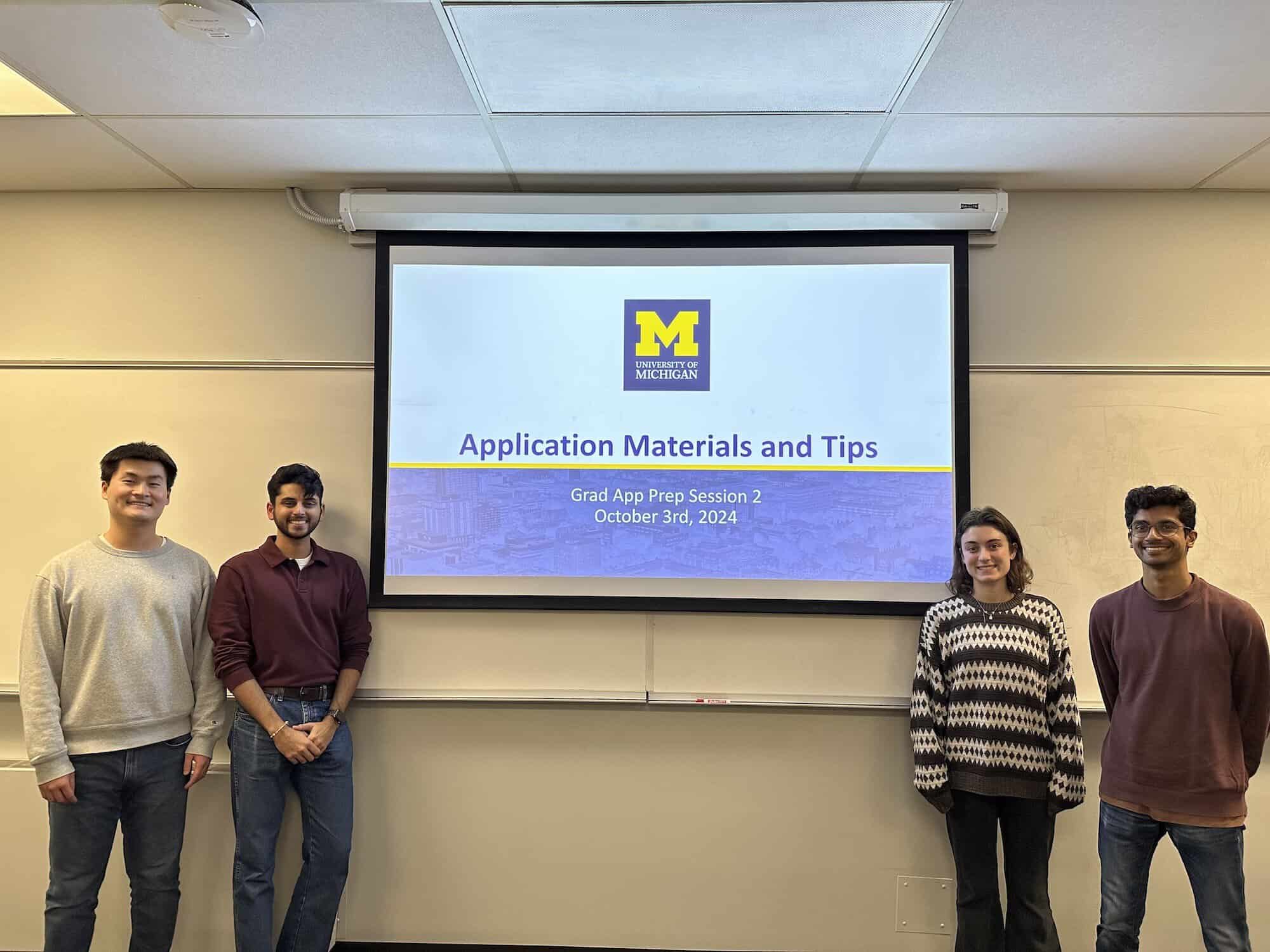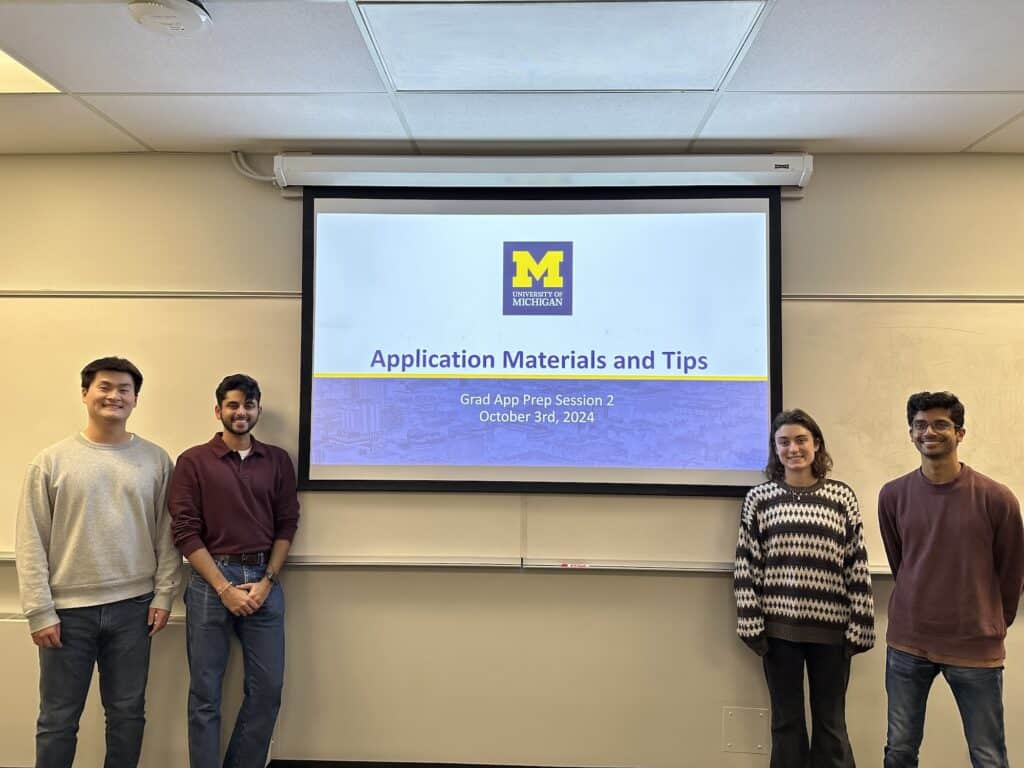
GAPS workshops demystify graduate school application process
Chemical Engineering graduate students lead a Grad App Prep Sessions (GAPS) workshop series for 70 College of Engineering undergraduates.

Chemical Engineering graduate students lead a Grad App Prep Sessions (GAPS) workshop series for 70 College of Engineering undergraduates.
Four Michigan Chemical Engineering graduate students, Anish Avasthi, Ajay Chavda, Aeva Silverman and Wen-Wei Wong hosted 70 students in Grad App Prep Sessions (GAPS) this fall. The three-part series of workshops aim to demystify the graduate school application process for undergraduate students in the College of Engineering.
Over the course of three weeks, the workshops provided undergraduates with advice and information on a range of topics such as preparing application materials, personal essays, standardized tests, fellowships, and how to make informed decisions on where to apply.
Undergraduate students interested in attending the next GAPS can reach out to Wen-Wei Wong ([email protected]) for additional information. These sessions are open to all College of Engineering undergraduate students interested in pursuing a graduate degree, especially juniors and seniors.
Each workshop in the series tackles a specific aspect of the graduate application process: funding opportunities, application materials and deciding where to apply.
One aspect that can make a potential applicant more competitive for graduate programs are fellowships. In this workshop, Wen-Wei Wong and Anish Avasthi, Michigan Chemical Engineering doctoral students in the Kamcev Lab, share advice based on their own experience applying for fellowships and securing external funding. They explain the variety of funding sources available, from internal scholarships provided by universities to external fellowships such as the National Science Foundation Graduate Research Fellowship (NSF) and Department of Defense National Defense Science and Engineering Graduate Fellowship (NDSEG).
Students were encouraged to start searching for funding opportunities early in the application process, as many external fellowships have deadlines that precede graduate school application deadlines.
“I think it’s really important to bring attention to fellowships like NSF and NDSEG,” Avasthi said, “as they are quite often overlooked by undergraduates who are eligible to apply.”
The workshop also includes practical tips on how to craft a competitive fellowship application, with an emphasis on the importance of essays, letters of recommendation, and aligning one’s research goals with the mission of the funding organization.
One of the most intimidating parts of the graduate school application process is organizing the various components of the application package. This workshop, led by Ajay Chavda, a second-year doctoral student in the Min Lab, and Aeva Silverman, a first-year doctoral student in the Kamcev and Goldsmith Labs, walk participants through the common materials expected by graduate admissions committees, like essays, letters of recommendation, transcripts, test scores, and more.
“It can be incredibly overwhelming to put together an application for a single school, let alone multiple,” said Chavda. “I know I would have appreciated someone walking me through not only what I was required to submit, but also how to construct an application that was competitive and representative of my desire to pursue a research-based degree.”

Examples of successful personal statements were shared, highlighting the importance of storytelling while remaining concise and professional. Participants were also given time to brainstorm ideas for their own essays, and the workshop leaders offered one-on-one feedback, encouraging students to focus on what sets them apart and why they’re passionate about their chosen field.
The workshop also covered other key parts of a successful application, like transcripts and GPA ranges for certain institutions, how to elicit strong letters of recommendation from letter writers, and exam requirements for domestic and international students.
The third workshop tackled one of the most difficult decisions prospective graduate students face: where to apply. With thousands of graduate programs across the country—and the world—choosing where to apply can feel overwhelming. In this session, student instructors including Aeva Silverman, discussed some of the key factors they recommend applicants consider, such as program reputation, faculty interests, funding opportunities, location, and the overall culture of the institution.
“It’s important to consider the cost of living in the area that an institution is located, beyond just the amount offered in a stipend,” said Silverman.
With graduate school often being a large transition for many people, knowing how to make an informed decision on where to apply and ultimately, where to commit, is crucial in ensuring a happy, successful graduate experience.
“These students are yearning for this kind of guidance,” Wong said. “I’m glad that we are able to be a part of their academic journey.”
The GAPS workshop leaders would like to thank Yoke Qi Ho, Dat Doi, Zoe Cruse, Travis Colbert and Trevor Kempmen for their participation as graduate student panelists. They would also like to thank the staff members Lisa Clark, Laura Bracken, and Mark Collyer for their logistical and marketing support. They would also like to thank the Chemical Engineering Graduate Student Society for their support in funding pizzas for each session.